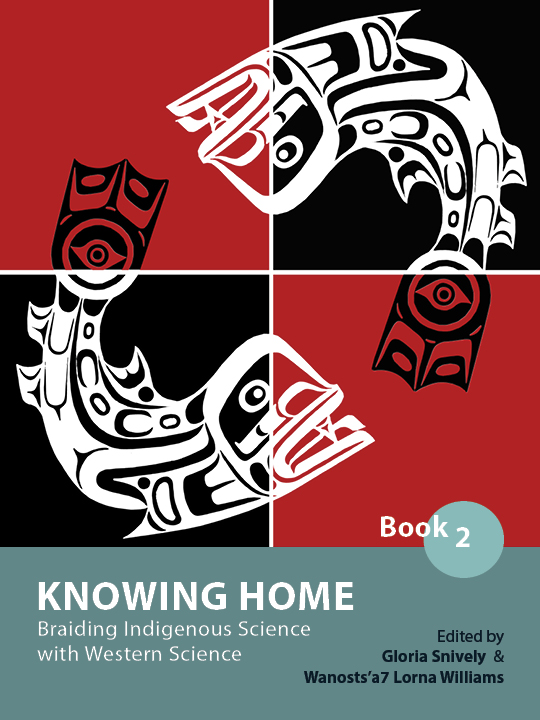KNOWING HOME, Book 2
Braiding Indigenous Science with Western Science
By GLORIA SNIVELY & LORNA WANOSTS’A7 WILLIAMS (Eds.)
2018
260 pages
Print, PDF, HTML

This work is licensed under a Creative Commons Attribution-NonCommercial-ShareAlike 4.0 International License.

Knowing Home weaves Indigenous perspectives, worldviews, and wisdom practices into the science curriculum. It provides a window into the scientific knowledge and technological innovations of the Indigenous peoples who live in Northwestern North America, thus providing numerous examples and cases for developing science lessons and curricula. Knowing Home shows how Indigenous perspectives can give insight and guidance as we attempt to solve the complex environmental problems of the 21st century.
Subjects: Indigenous science, western science, science curriculum, British Columbia
Grants: Funded by BCcampus‘ Open Educational Resource Grant.![]()
Dr. Gloria Snively is Professor Emeritus at the University of Victoria where she taught science methods, environmental/marine education, and culture courses. She was Director of the Graduate Program in Environmental Education. For 12 years, she was involved with the Asia Pacific Network whose purpose is to strengthen links between the research community and school-based environmental education in the Asia-Pacific region. Her work with Indigenous education spans 4 decades and has always been inspired by Indigenous leaders. She enjoyed giving natural history talks and walks to students, teachers, park interpreters, First Nations and community groups for 50 years; she prefers to explore forest, ponds and seashores first-hand.
Dr. Wanosts’a7 Lorna Williams, O.C., O.B.C. walking in peace is Lil’wat of the St’at’yem’c First Nation. Her life has been devoted to promoting and restoring Indigenous culture and language. She worked as an Indigenous educator and language specialist for more than 50 years in diverse settings, including Indigenous communities, public schools, and adult education settings. Dr. Williams recently retired from the University of Victoria as Canada Research Chair in Indigenous Knowledge and Learning (co-appointment with Faculty of Education and Department of Linguistics) and an associate professor, where she developed and delivered an innovative series of courses on learning and teaching in an Indigenous world.
LIST OF FIGURES
LIST OF TABLES
TERRITORIAL ACKNOWLEDGEMENT
FOREWORD
PREFACE
ACKNOWLEDGEMENTS
CONTRIBUTING AUTHORS
CONTRIBUTING ARTISTS
Chapter 1 | BRAIDING I.S. WITH W.S.
Chapter 2 | TRANSFORMING TEACHER THINKING ABOUT I.S. THROUGH CULTURAL EXPERIENCE
Chapter 3 | METAPHORICAL IMAGES OF SCIENCES
KWAKWAKA‘WAKW: COLONIZATION, RESISTANCE, AND REVITALIZATION OF CULTURE
Chapter 4 | THE METAPHOR INTERVIEW AND KWAKWAKA‘WAKW STUDENTS’ ORIENTATIONS TO THE SEASHORE
Chapter 5 | CULTURAL BELIEFS AND VALUES & INSTRUCTIONAL METAPHORS IN THE SCIENCE CLASSROOM
Chapter 6 | SIGNIFICANT LIFE EXPERIENCES & LONG-TERM ORIENTATIONS TO THE SEASHORE
Chapter 7 | CROSS-CULTURAL MARINE SCIENCE
Chapter 8 | DIGITAL VIDEO AS LEARNING TOOL FOR RETAINING AND TRANSFERRING I.K.
Chapter 9 | LEARNING FROM THE HOMELAND
Appendix A | METAPHOR QUESTIONS FOR CH. 3
Appendix B | METAPHOR QUESTIONS FOR CH. 4-6
